TNREGINET - ஆன்லைன் தமிழ்நாடு என்கம்பரன்ஸ் சான்றிதழ்
TNREGINET, the Tamil Nadu Registration Department's online portal, facilitates the issuance of the Encumbrance Certificate (EC). This legal document, abbreviated as EC, is provided by the sub-registrar and contains crucial information such as property ownership, past transactions, and relevant details. In Tamil Nadu, the EC obtained through TNREGINET is compelling evidence of rightful property ownership, which is vital in averting legal conflicts. The online platform smoothens the process, allowing property owners to access and validate their property details conveniently. TNREGINET ensures a smooth and transparent experience for real estate transactions in the state, enhancing the efficiency of property-related documentation.
Why is it Important to Have an Encumbrance Certificate in Tamil Nadu?
- Proof of Ownership: Obtaining an Encumbrance Certificate (EC) in Tamil Nadu is proof of property ownership. It indicates the property is free from legal or financial liabilities, such as mortgages, liens, or pending loans.
- Legal Protection: When purchasing a property, ensuring no disputes are associated with it. The EC plays a vital role in verifying the legal status of the property, ensuring there are no legal claims or pending litigations against it.
- Smooth Property Transactions: Whether buying or selling a property, potential buyers or banks often require an EC to verify the ownership and legality of the property. The absence of encumbrances, as confirmed by the EC, ensures a smooth and hassle-free property transaction process.
- Availing Loans and Mortgages: Financial institutions, including Kotak, typically require an Encumbrance Certificate as a mandatory document when applying for a loan or mortgage against a property.
- Securing Legal Clearances: In certain cases, an EC must obtain legal clearances from government authorities for property-related transactions, such as property development, construction, or land conversion.
- Prevention of Fraud and Scams: The EC is an important deterrent against fraudulent activities related to property transactions. By obtaining an Encumbrance Certificate, buyers can be assured the property they invest in is legally sound and free from any hidden liabilities or claims.
How to Apply for an Encumbrance Certificate Online in Tamil Nadu?
Applying for an Encumbrance Certificate (EC) in Tamil Nadu is a simple process through the TNREGINET portal. Follow these steps to initiate the application:
- Begin by registering on the TNREGINET If you're a new user, sign up by providing essential details such as username, password, address, and identification number (PAN/Aadhaar/driving license). Verify your details through the OTP sent to your registered contact number.
- Once registered, log in to the TNREGINET portal using your credentials.
- Go to the 'Encumbrance Certificate' section and proceed to 'Search and apply EC.'
- Provide necessary details, including location (Zone, district, sub-registrar office), time (EC start and end date), survey details, house details, and additional information.
- After entering the details, search for the EC. Documents corresponding to your input will be displayed. Proceed to 'Apply Online.'
- Enter your name and contact details, and save the information. Proceed to the payment section.
- Review your payment details, select the payment option, and proceed to the e-payment screen. Provide the required details for e-payment and complete the process.
- Upon successful payment, note the bank reference, CIN, and transaction ID received. These details are essential.
- After data selection and the sub-registrar's approval, access the TNREGINET EC with a QR code on all pages and the sub-registrar's digital signature. You will also receive an SMS notification confirming the transaction.
Documents Required to Apply for Encumbrance Certificate Offline in Tamil Nadu
When opting for the offline mode to apply for an Encumbrance Certificate (EC) in Tamil Nadu, ensure you have the following documents ready:
- Attested Copy of Address Proof: Include an attested copy of your address proof. This could be documents like an Aadhaar card, Passport, Voter ID, or any other valid proof recognised by authorities.
- Property Details: Provide comprehensive details about the property for which you seek the certificate. This may include survey numbers, subdivision numbers, and any specific details identifying the property.
- Title Details: Furnish title details, encompassing ownership documents and any relevant legal records associated with the property. These documents serve as critical evidence supporting the title and ownership status.
Steps to Apply for Encumbrance Certificate Offline in Tamil Nadu
Applying for an Encumbrance Certificate (EC) offline in Tamil Nadu involves a straightforward process. Follow these steps to obtain the certificate:
- Visit the sub-registrar's office and submit the necessary documents and a duly filled application form. Ensure you include an attested copy of your address proof, property details, and relevant title documents.
- The authorities at the sub-registrar's office will meticulously review all submitted documents to verify their legal validity. This step ensures the accuracy and authenticity of the provided information.
- After document verification, the relevant authority will initiate a thorough review process. This involves examining the property's title details and associated legal records.
- Upon successful review, the Encumbrance Certificate will be issued. It will comprehensively list all transactions linked to the property. If there are no transactions, a Nil Encumbrance Certificate confirming the absence of encumbrances will be issued.
- The issuance of the certificate may take approximately 15-30 days from the date of application. It is advisable to check with the sub-registrar's office for the exact timeline.
How to View/Download Tamil Nadu Encumbrance Certificate?
- Begin by visiting the official TNREGINET portal to initiate the process.
- On the homepage, locate and click the ‘Encumbrance Certificate’ section. Choose the ‘Search/View EC’ tab.
- Opt for the ‘EC’ search option. This will prompt you to provide details such as the village, EC start date, EC end date, Sub-Registrar Office, Zone, District, and other relevant information.
- Fill in the required fields and click on the “Search” button. Enter the CAPTCHA code as prompted.
- The system will promptly generate and display the Encumbrance Certificate. You can view it online or download the certificate for your reference.
Following these steps, you can conveniently get the TNREGINET EC to view or download your Tamil Nadu Encumbrance Certificate through the TNREGINET portal.
How to Obtain a Digitally Signed EC in Tamil Nadu?
- Visit TNREGINET Website: Begin by visiting the official TNREGINET website to initiate the process.
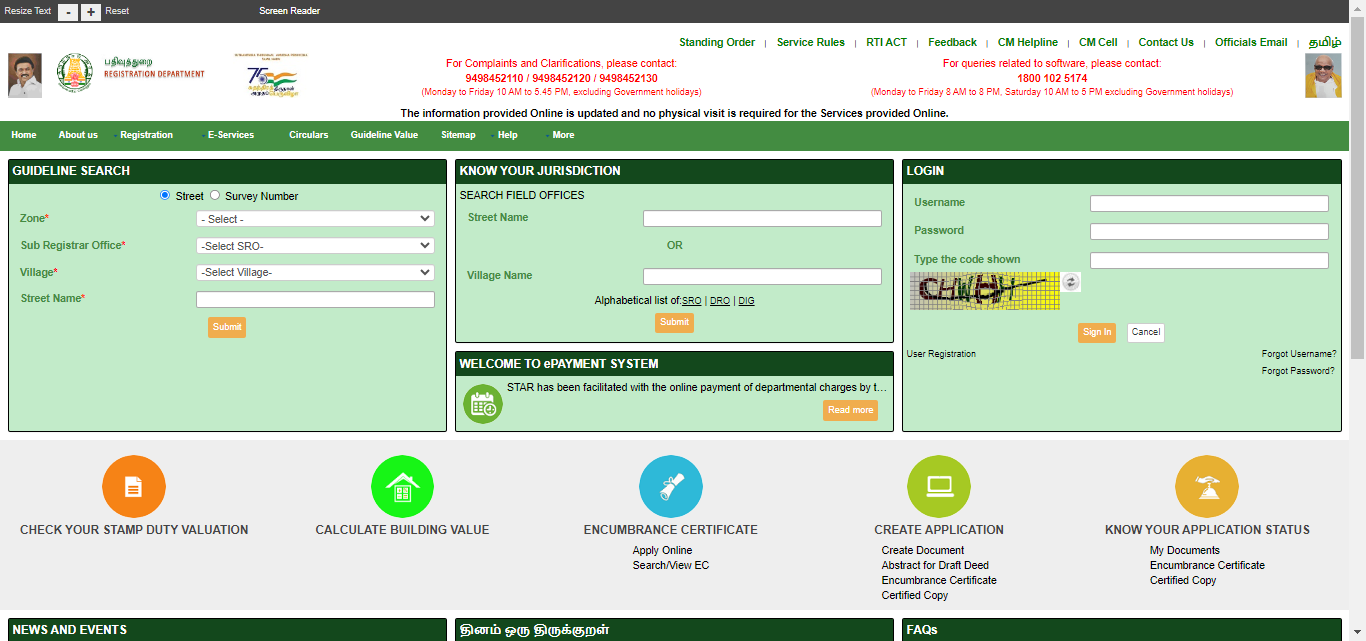
- Access e-Services Menu: Go to the ‘e-Services’ drop-down menu on the website.
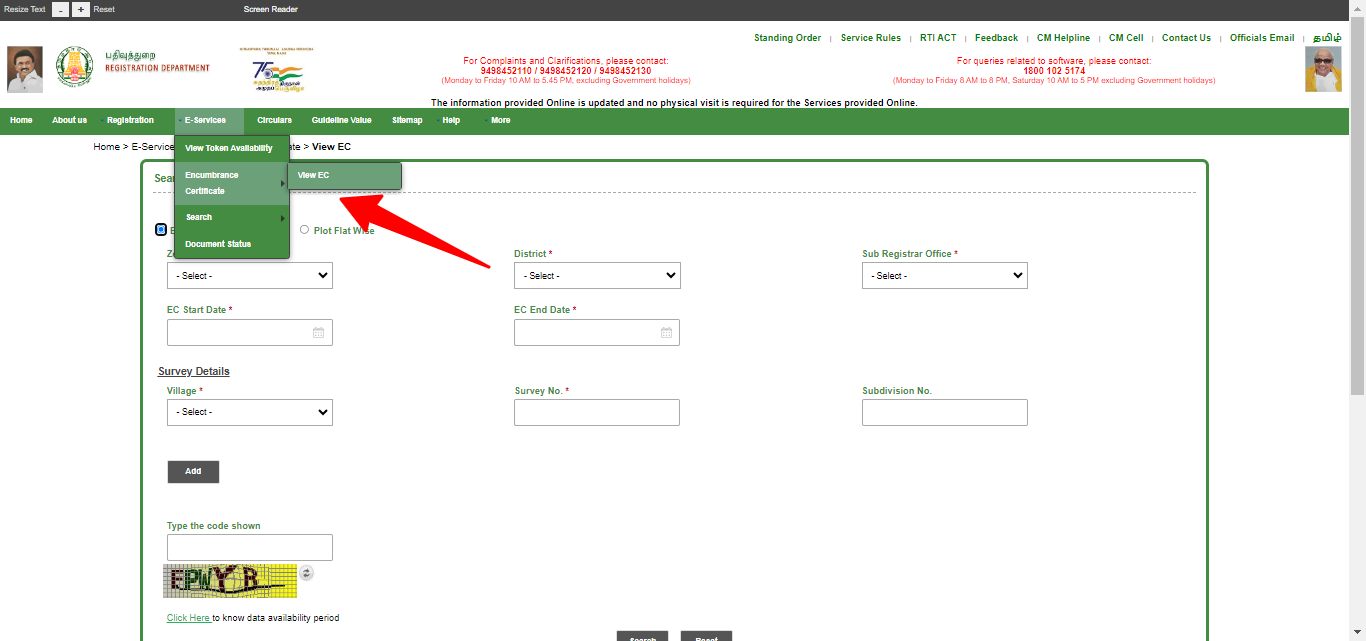
- Select Encumbrance Certificate: If you are a TN e-registered user, choose the ‘Encumbrance Certificate’ option and click ‘Search and Apply EC.’ For non-registered users, it is necessary to register on TNREGINET first.
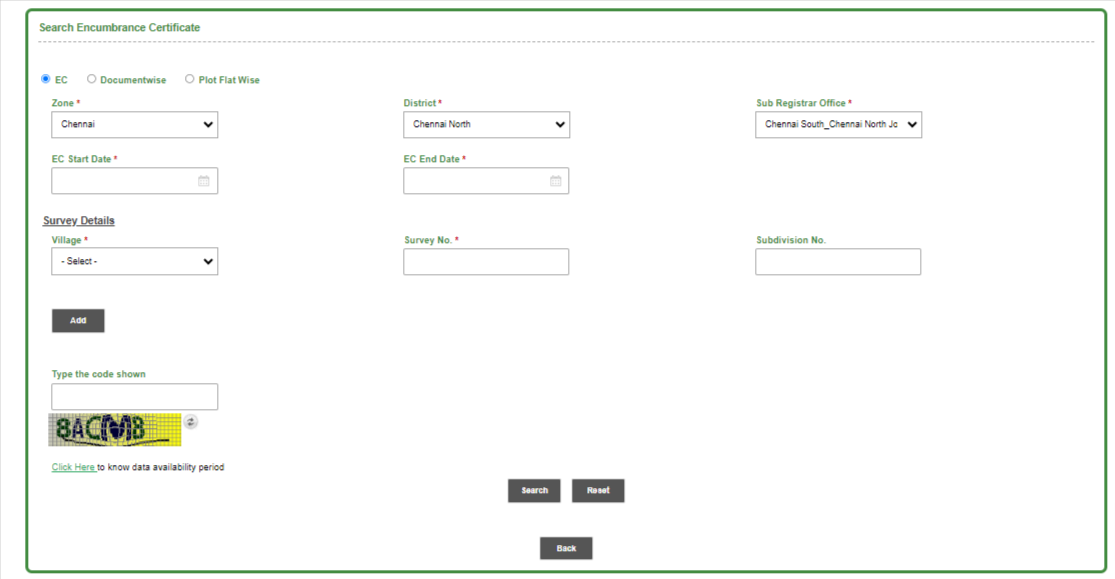
- Payment Process: Make the required payment for the EC through the portal. Follow the instructions provided to complete the payment process.
- Download Digitally Signed EC: Once the payment is successful, a digitally signed copy of the online EC of Tamil Nadu can be downloaded from the ‘Request List’ tab. This document will bear the digital signature, ensuring its authenticity.
How to Track Encumbrance Certificate in Tamil Nadu Application Status?
To monitor the status of your Encumbrance Certificate (EC) application in Tamil Nadu, follow these simple steps on the TNeGA portal:
- Visit TNeGA Portal: Access the official TNeGA portal through your web browser: https://www.tnesevai.tn.gov.in/
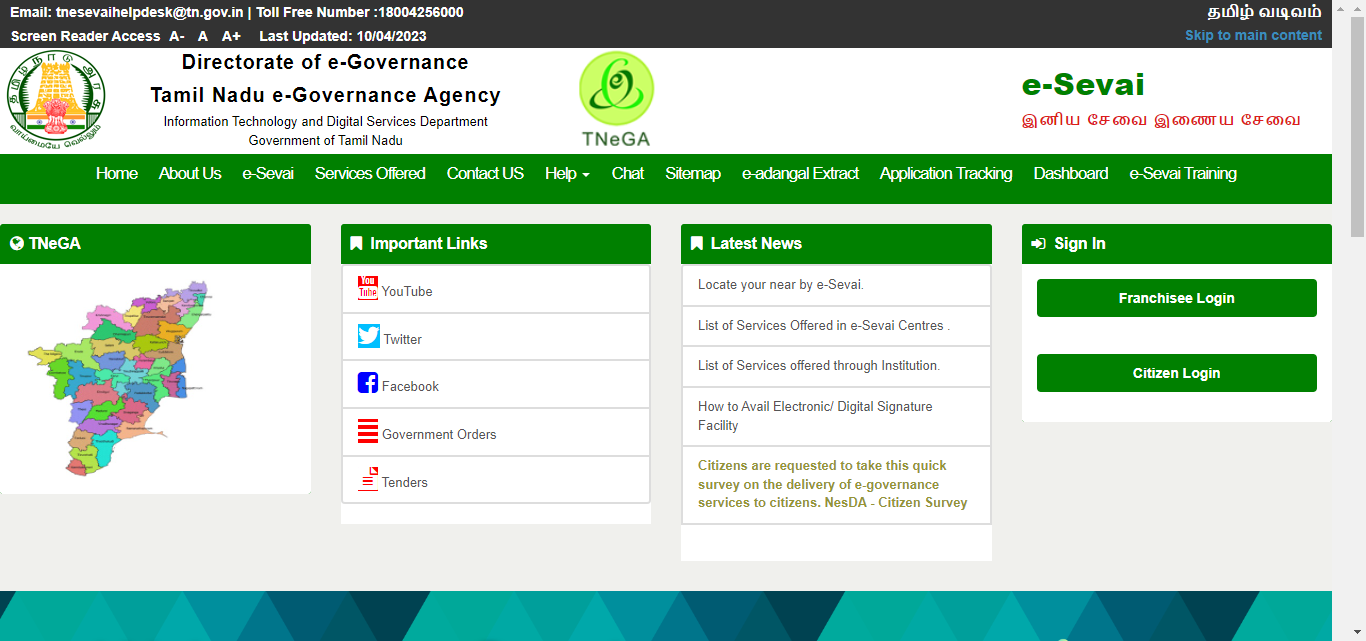
- Create User ID: If you haven't already, create a user ID on the portal.
- Log In: Log in to the portal using your credentials.
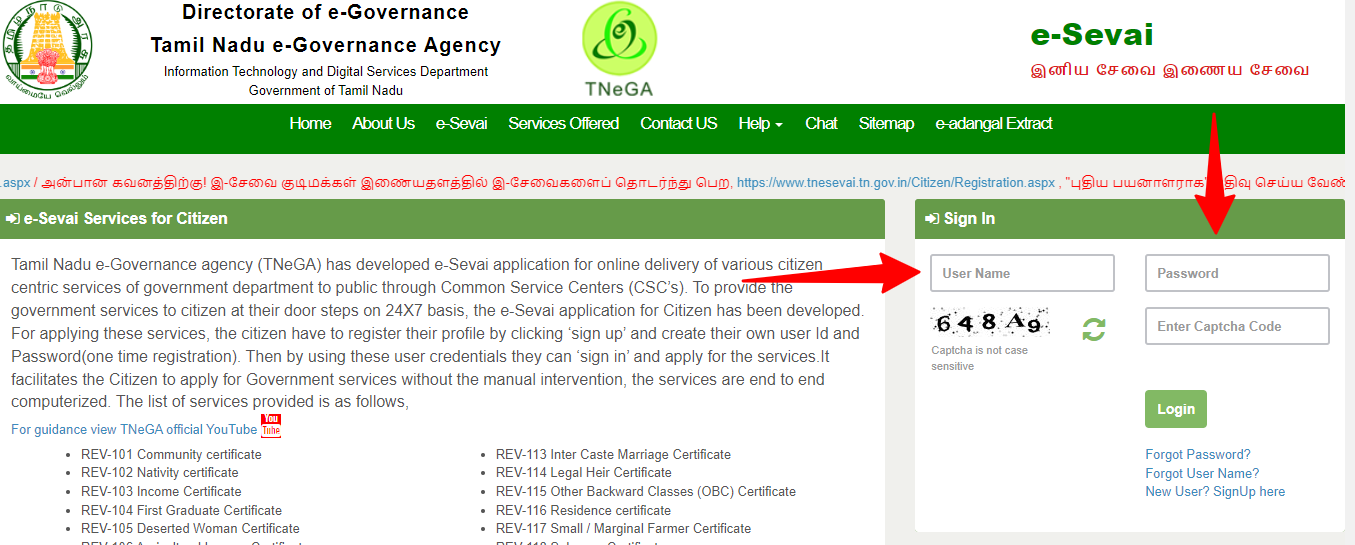
- Check Status: On the portal dashboard, find and click on the ‘Check Status’ option.
- Enter Transaction/Application Number: Input your EC application's relevant Transaction Number or Application Number.
- Fetch Status: Click on the ‘Fetch’ button to retrieve and display the current status of your Encumbrance Certificate application.
Why and When is an Tamilnadu Encumbrance Certificate Required?
An Encumbrance Certificate (EC) in Tamil Nadu is indispensable when considering property transactions, ensuring a transparent and secure process. This document is a crucial indicator of a property's legal and financial health. It verifies the absence of encumbrances like loans or legal claims, establishing your rightful ownership and preventing potential disputes. Financial institutions often demand ECs when processing loans, offering assurance regarding the property's clear title. Additionally, ECs are vital for property mutation, Khata Registration, and Patta Transfer tasks. Obtaining an EC is essential during property sales, withdrawals from PF for property purposes, home construction, and overall property purchases, safeguarding transactions from potential complications. An Encumbrance Certificate (EC) is important for a smooth Home Loan approval process with Kotak.
Also Read: What is CERSAI?





